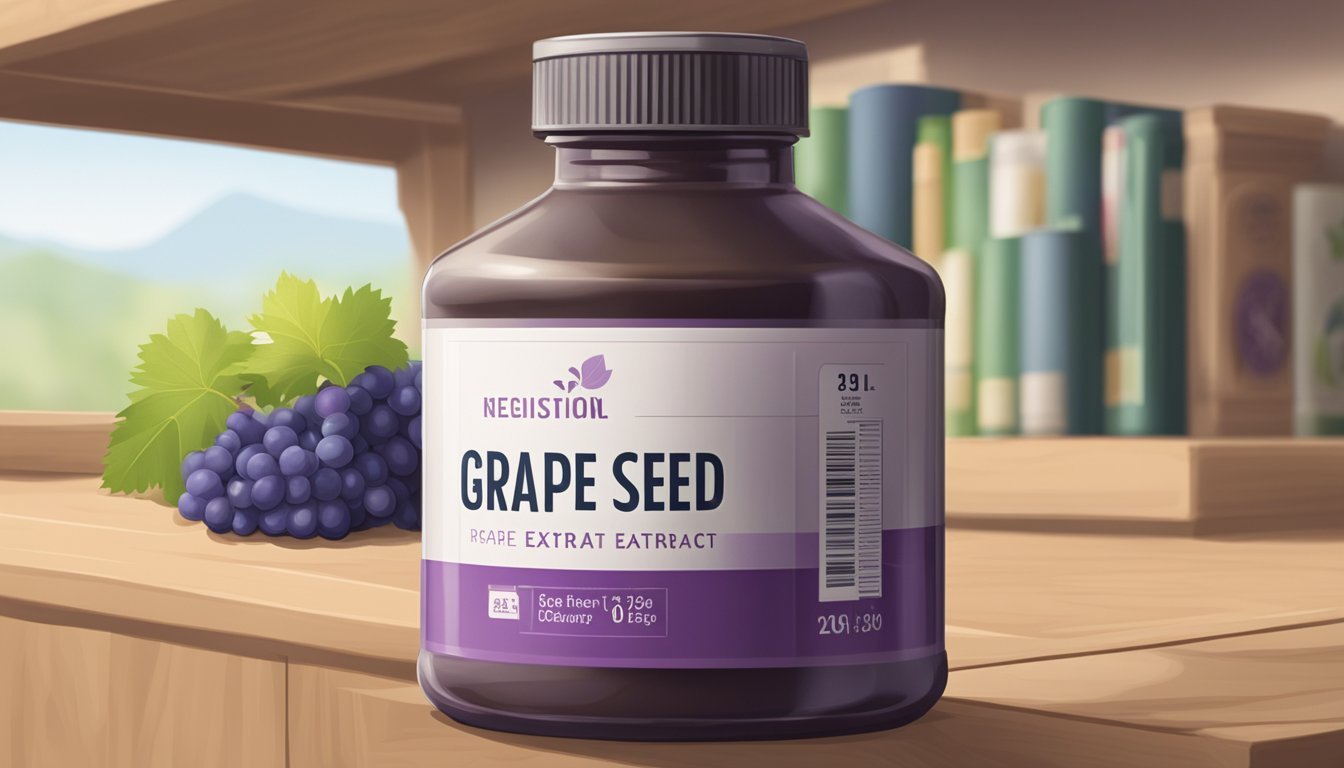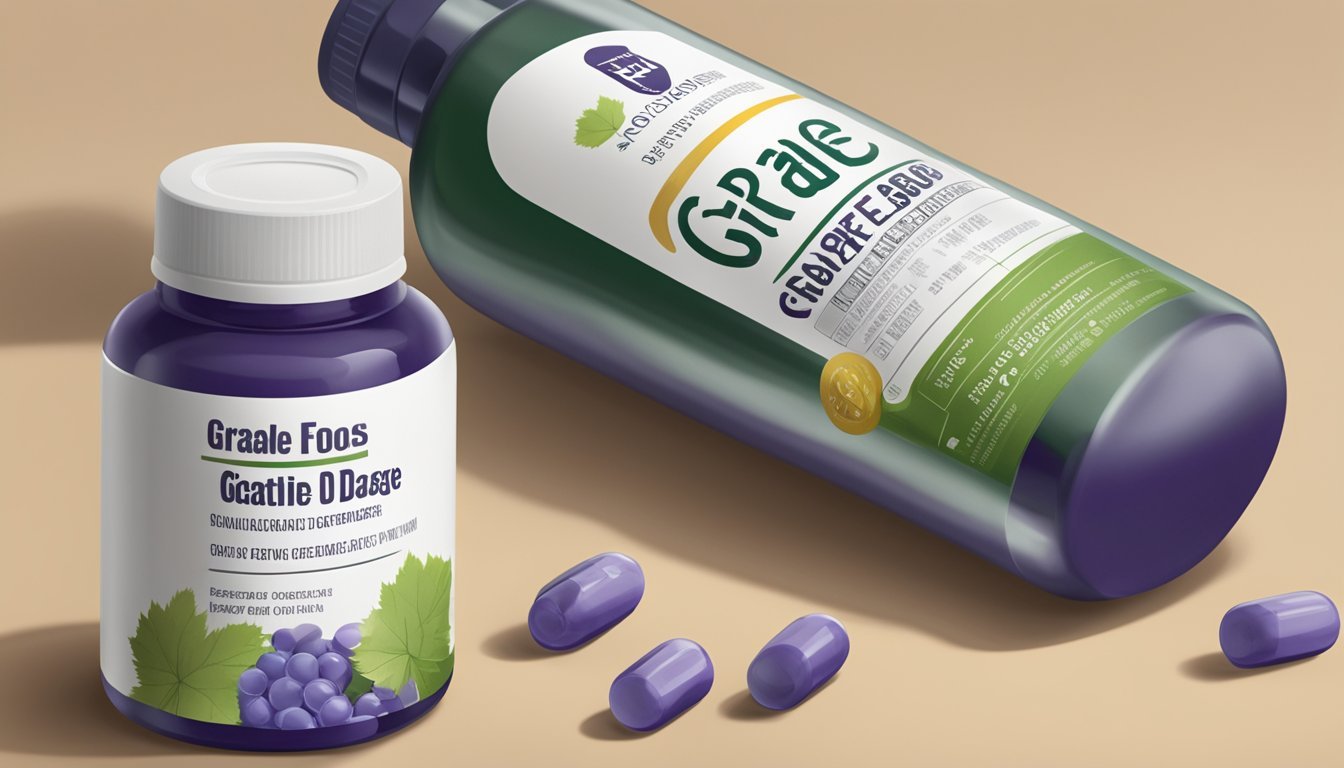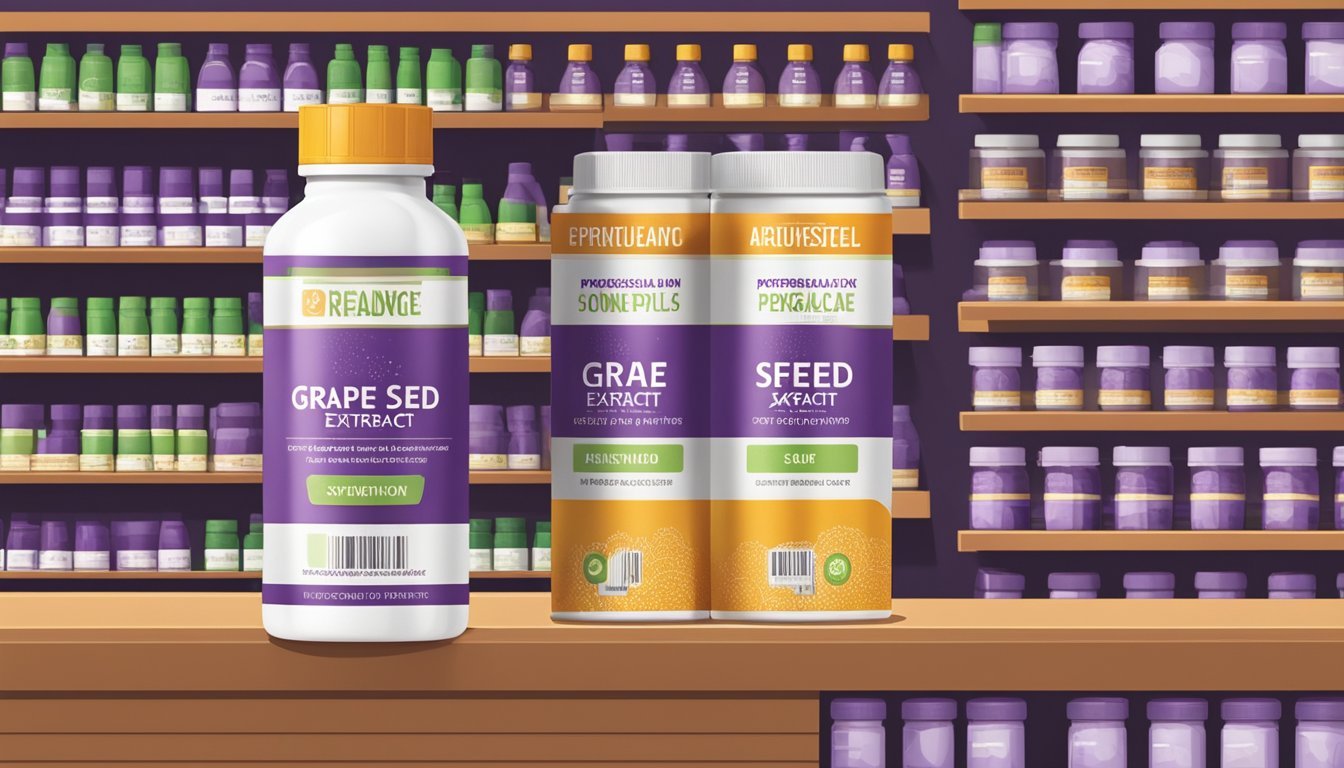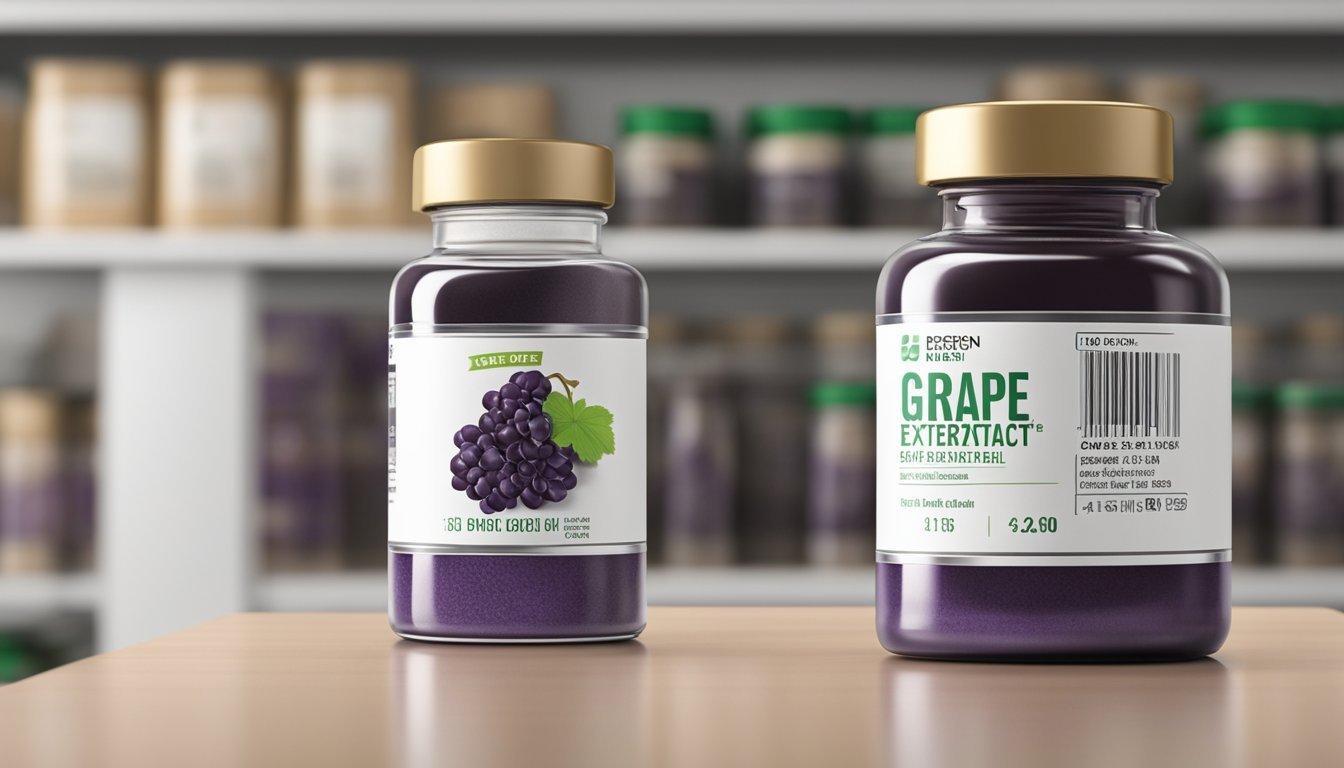How Long Does Grape Seed Extract Last?
Understanding Shelf Life and Potency
Grape seed extract is a natural supplement derived from the ground-up seeds of grapes, a byproduct of the winemaking process. Rich in antioxidants, including oligomeric proanthocyanidin complexes, flavonoids, and polyphenols, it offers various potential health benefits. Antioxidants are known for their ability to combat oxidative stress and may contribute to heart health, improved circulation, and a strengthened immune system.
The shelf life of grape seed extract, like many supplements, is influenced by several factors including the form it’s in, storage conditions, and the presence of preservatives. Typically, grape seed extract in its encapsulated form is stable and tends to have a longer shelf life than liquid extracts or powders. Manufacturers will often indicate an expiration date on the packaging, which consumers should adhere to in order to ensure potency and safety.
When considering incorporating grape seed extract into a health regimen, it is essential to understand not just the potential health benefits, but also how to properly store the supplement and recognize signs of degradation. Keeping grape seed extract in a cool, dry place, away from direct sunlight, helps maintain its quality. As with any supplement, it is recommended to consult with a healthcare provider before starting to ensure it aligns with individual health needs and does not interact with other medications.
Overview of Grape Seed Extract
Grape Seed Extract (GSE) is a supplement derived from the seeds of grapes, known as Vitis vinifera. It is rich in antioxidants, specifically oligomeric proanthocyanidins (OPCs) and other polyphenols, which are associated with a variety of health benefits.
Definition and Composition
Grape Seed Extract is obtained from the ground-up seeds of grapes. The key active components in this extract are proanthocyanidins, also known as OPCs, which are a category of polyphenolic compounds. These compounds are known for their potent antioxidant properties, allowing them to protect the body against oxidative stress and free radical damage.
Historical Context
The use of grape seeds can be traced back to traditional European practices, where they were used for their medicinal properties. Over time, the extract has been commercialized and now is widely available as a dietary supplement. The historical use of grape seeds has laid the foundation for contemporary studies into the therapeutic applying of Vitis vinifera extracts.
Sources and Varieties
Grape Seed Extract is primarily sourced from the seeds of wine grapes following the wine-making process. Although many varieties of grapes exist, the extract generally focuses on the seeds from the Vitis vinifera species. Supplements can differ based on the extraction method and the origin of the grape seeds, which can affect the concentration of OPCs and overall potency of the GSE.
Potential Health Benefits
Grape seed extract is celebrated for its concentrated antioxidants and has been studied for a variety of health benefits. These benefits range from bolstering cardiovascular health to potential protective effects against certain forms of cancer.
Antioxidant Properties
Grape seed extract is a potent source of antioxidants which include compounds such as vitamin E, flavonoids, linoleic acid, and oligomeric proanthocyanidin complexes (OPCs). These antioxidants help to neutralize free radicals, which can reduce oxidative stress and may prevent cellular damage.
Cardiovascular Health
The compounds in grape seed extract may benefit cardiovascular health by strengthening blood vessels and improving circulation. Some studies suggest that it may also help lower the levels of low-density lipoprotein (LDL), commonly known as the "bad" cholesterol, thus potentially reducing the risk of heart disease.
Effects on Blood Pressure
Grape seed extract may exert a favorable effect on blood pressure. Research indicates that its use may lead to improvements in the blood pressure of individuals with high blood pressure, which is a key factor for heart health.
Anti-Inflammatory Actions
Inflammation is a normal immune response, but chronic inflammation is associated with numerous diseases. The anti-inflammatory properties of grape seed extract may help with conditions characterized by inflammation, thereby promoting overall health.
Cancer Prevention Potential
There are initial indications that grape seed extract might offer protective benefits against cancer. The antioxidants in grape seed extract have been observed to inhibit the growth of several types of cancer cells in laboratory studies.
Skin and Wound Healing
Grape seed extract has been documented to support skin health by protecting against photodamage and promoting the synthesis of collagen, which is essential for maintaining skin elasticity. Evidence also supports its role in expediting the wound healing process due to its antioxidant and anti-inflammatory properties.
Usage and Dosage
Grape seed extract (GSE) is recognized for its potential health benefits, commonly available in various formulations. Adjusting the dosage according to specific needs and guidelines is crucial for its effective and safe application.
Recommended Dosage
The dosage of grape seed extract can vary depending on the purpose of use and the individual's health status. Typical doses range from 100 to 300 mg per day and have been used safely for up to 12 weeks. Lower doses of 100-800 mg daily for 8-16 weeks have shown promise in scientific studies, albeit higher doses are not necessarily correlated with increased effectiveness.
Usage in Medicine
In medicine, grape seed extract is utilized for its antioxidant properties, often to support cardiovascular health and improve poor circulation. It's also used for reducing swelling caused by injuries and to help with eye disease related to diabetes. Medical practitioners may recommend GSE as a dietary supplement to aid in various health concerns, emphasizing its inclusion as part of a broader treatment plan.
Formulations and Availability
Grape seed extract is available in several forms to cater to consumer preferences and absorption rates:
Capsules and Tablets: Easy to consume with predetermined dosages.
Liquid form: Allows for flexible dosing and is often preferred for those who have difficulty swallowing pills.
Oil: Sometimes used topically or mixed into foods.
It is widely sold over-the-counter in pharmacies, health food stores, and online as a dietary supplement, making it easily accessible to those looking to include it in their diet.
Interactions and Safety Considerations
When considering grape seed extract supplementation, it is essential to be aware of its possible side effects, potential interactions with medications, and specific groups who should exercise caution. The safety of grape seed extract in pregnant or breastfeeding individuals has not been established. Additionally, those with bleeding disorders or those undergoing surgery should be wary due to the extract's potential effect on bleeding.
Possible Side Effects
Grape seed extract is generally considered safe when used in moderation. However, some individuals may experience side effects such as:
Headache
Itchy scalp
Dizziness
Nausea
In rare cases, allergic reactions may occur. If symptoms persist or worsen, it is advised to discontinue use and consult a healthcare provider.
Contraindications and Cautions
Individuals who are pregnant or breastfeeding should avoid using grape seed extract due to insufficient evidence regarding its safety. Moreover, those with bleeding disorders or those who are anticipating surgery should be cautious, as grape seed extract might slow blood clotting.
Special considerations include:
Venous insufficiency: While some use grape seed extract to aid this condition, medical advice is recommended beforehand.
Obesity: There may be some benefit for heart health in obese individuals, but a healthcare provider should be consulted for personalized advice.
Interactions with Medications
Grape seed extract can interact with certain medications, particularly those that affect blood clotting. Care should be taken if an individual is on:
Blood thinners: such as warfarin (Coumadin), clopidogrel (Plavix), or aspirin.
Medications metabolized by liver enzymes (Cytochrome P450 3A4 substrates): Consult with a healthcare professional to avoid any potential interactions.
Medication interactions table:
Medication Type Concern Blood thinners Increased risk of bleeding. Cytochrome P450 3A4 substrates Could alter the efficacy of other medications metabolized by the liver.
To avoid complications, it is important for individuals to discuss their use of grape seed extract with a healthcare provider, especially if they are taking any of the mentioned medications or have pre-existing health concerns.
Storage and Shelf Life
When it comes to grape seed extract, its stability and efficacy largely depend on proper storage conditions and an understanding of its expected shelf life.
Optimal Storage Conditions
For maintaining the quality of grape seed extract, certain storage conditions are pivotal. The product should be stored in a cool, dark place, away from direct sunlight, as light can degrade the active compounds. Temperature fluctuations should be minimized, so a consistent, cool environment is ideal. Containers housing the extract should be airtight to prevent oxidation, which could compromise the extract's potent properties. Moisture can be detrimental to the formulation, hence the storage area should be dry to deter mold and bacterial growth.
Expiration and Effectiveness
Grape seed extract typically comes with an expiration date, which should be adhered to ensure maximum efficacy. Past this date, the extract might not necessarily be harmful, but the potency of its bioactive components may diminish. Signs of spoilage can include changes in color, odor, or texture. The effectiveness of the extract relies on the integrity of its polyphenols, and these can be susceptible to degradation over time, especially if exposed to adverse storage conditions. Consumers should replace their grape seed extract according to the manufacturer's recommendations to ensure they benefit from its qualities.
Clinical Evidence and Research
Extensive research has been conducted into grape seed extract's (GSE) affect on health, particularly its efficacy, antioxidant impact, and broader health outcomes gathered through meta-analysis.
Studies on Efficacy
Clinical studies indicate that GSE may help manage health conditions that stem from oxidative stress. Randomized controlled trials have shown GSE's potential in reducing high blood pressure and improving blood circulation. However, the efficacy of GSE in these studies often shows inconsistent results, with some research suggesting benefits for hypertension management, while others are inconclusive.
Research on Antioxidant Impact
Grape seed extract's antioxidant properties are thought to reduce oxidative stress, protecting against cellular damage and diseases like atherosclerosis. It is suggested that GSE may help in lowering LDL (bad cholesterol) levels, which is a significant risk factor for developing cardiovascular diseases.
Meta-Analysis of Health Outcomes
Researchers have conducted meta-analyses to summarize GSE's effect on health from multiple studies. These analyses often find that while GSE shows promise in areas such as reducing edema and improving bone strength, there is a need for more standardized research to confirm these findings. GSE's role in ameliorating conditions like Alzheimer’s disease and improving memory has also been explored, but the evidence remains mixed and requires further investigation.
Dietary and Nutritional Aspects
In understanding the role of grape seed extract in diet and its comparison with other nutrients, it's essential to consider its composition and how it contributes to overall nutritional intake.
Grape Seed Extract in Diet
Grape seed extract (GSE) is often consumed as a dietary supplement rather than a food source. It is rich in phenolic acids, flavonoids, and specifically oligomeric proanthocyanidin complexes (OPCs), which are known for their antioxidant properties. These components contribute to the extract's potential benefits in promoting heart health and may offer protection against neurodegenerative diseases. GSE can be found on labels in various forms, including tablets, capsules, and liquids, with common dosages ranging from 50-100 milligrams.
Comparison with Other Nutrients
GSE stands out for its high antioxidant content compared to other dietary supplements and nutrients. While foods like fruits and vegetables provide essential nutrients like vitamin C, iron, protein, and calcium, GSE is particularly noted for its concentration of certain antioxidants like flavonoids and gallic acid.
Vitamin C: GSE contains flavonoids that can enhance the absorption of vitamin C, which is vital for skin health and immune function.
Iron: While not a direct source of iron, the antioxidants in GSE may aid in protecting cells from oxidative stress often associated with iron metabolism.
Pycnogenol: This is another antioxidant found in some pine bark extracts, similar to GSE, and is also marketed for its health benefits.
Candida and Heart Health: Although not a direct treatment, some research suggests that the antifungal properties of GSE may be beneficial against Candida infections, and flavonoids may contribute to cardiovascular health.
When comparing GSE to other dietary supplements and nutrients, it is notable for its specific antioxidant compounds, which may complement a balanced diet rich in various nutrients.
Legislation and Regulation
In the realm of grape seed extract (GSE), regulation is key to ensuring product quality and safety. These regulations govern how grape seed extract is prepared, labeled, and sold to ensure that consumers receive a consistent and safe product.
Quality Control
Manufacturers of grape seed extract supplements are required to adhere to strict guidelines to guarantee the consistency and purity of their products. These guidelines typically encompass testing for active ingredient concentration and screening for contaminants. The enforcement of such measures ensures that grape seed extract products remain efficacious and free from adulteration.
Key Aspects of Quality Control:
Active ingredient testing
Contaminant screening
Labeling Requirements
Labels on grape seed extract products must accurately represent the contents of the supplement. Regulated entities, such as the Federal Trade Commission (FTC), mandate truth-in-labeling laws that are instrumental in preventing deception or inaccuracies on supplement labels. This includes clear indications of the concentration of grape seed extract and any other added ingredients.
Primary Labeling Elements:
Accurate ingredient list
Clear concentration details
Manufacturing Practices
The process of manufacturing grape seed extract supplements is regulated to assure they are produced in a consistent and clean manner. Manufacturers must comply with Good Manufacturing Practices (GMP) which are established by the Food and Drug Administration (FDA). These practices are designed to eliminate the risk of contamination and ensure that the supplements are created in a controlled environment following stringent standards.
Highlights of Good Manufacturing Practices:
Controlled production environment
Minimized contamination risk
Consumer Considerations
When choosing grape seed extract supplements, consumers should consider quality, cost, and ease of access to ensure they are selecting a product that suits their needs and budget, while also consulting with healthcare providers to determine suitability.
Choosing Quality Supplements
Consumers should scrutinize the label of grape seed extract supplements for information on sourcing, manufacturing standards, and potency. Supplements should come from reputable companies that adhere to Good Manufacturing Practices (GMP). Quality supplements often have a certification from third-party organizations verifying their contents. It is also crucial to check for an expiration date as potency can diminish over time.
Cost Factors
The price of grape seed extract supplements can vary, influenced by:
Product potency
Brand reputation
Manufacturing standards
Consumers should consider that higher cost does not always equate to higher quality. It can be beneficial to compare products and prices to find a supplement that provides value without compromising on quality.
Availability and Access
Grape seed extract supplements are widely available in various forms, such as:
Tablets
Capsules
Liquids
They can be found in health food stores, pharmacies, and online platforms. Accessibility may depend on geographic location and local regulations. Consulting a doctor or a healthcare provider can also guide consumers to trusted sources for purchasing these supplements.








